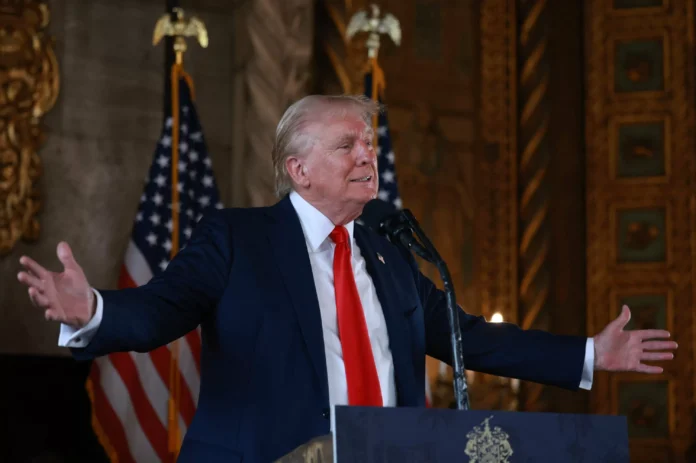Republican candidate Donald Trump has once again made headlines with his latest statement on the Federal Reserve (Fed). On Thursday, Trump stated that U.S. presidents should have a say in the decisions made by the Fed, emphasizing the need for a stronger and more influential role of the president in shaping economic policies.
This statement marks Trump’s strongest indication yet of his desire to have a more hands-on approach when it comes to the Fed, a move that has sparked much debate and speculation among economists and political analysts.
In his statement, Trump argued that the Fed should not be making decisions in a vacuum, but rather should seek input from the president who has a better understanding of the country’s economy. He suggested that the current system, where the Fed operates independently from the government, is flawed and has led to unfavorable outcomes for the American people.
This is not the first time Trump has expressed his dissatisfaction with the Fed. In the past, he has been critical of the central bank’s policies, particularly its decision to raise interest rates, which he believes has hindered economic growth. Trump has also accused the Fed of being politically biased, claiming that it has been working against him and his administration.
Many experts have raised concerns about Trump’s stance on the Fed, stating that it goes against the principles of an independent central bank. They argue that allowing the president to have a say in the Fed’s decisions could lead to political interference and jeopardize the stability and credibility of the institution.
Despite these concerns, Trump’s supporters believe that his proposal could bring positive changes to the country’s economic policies. They believe that the president, being the leader of the nation, should have a more influential role in shaping the economy and ensuring its growth and prosperity.
Moreover, Trump’s statement has resonated with many Americans who feel that their voices are not being heard in the decision-making process of the Fed. They see the president’s proposal as a way to hold the Fed accountable for its actions and to bridge the gap between the government and the central bank.
Trump’s call for a stronger role of the president in the Fed’s decision-making process is reflective of his promise to put America first. He believes that by having a say in the Fed’s policies, he can ensure that the best interests of the country and its citizens are being served.
This move also aligns with Trump’s overall economic agenda, which focuses on boosting economic growth, creating jobs, and reducing the national debt. By having a say in the Fed’s decisions, Trump believes that he can steer the country in the right direction and achieve his economic goals.
However, some critics remain skeptical of Trump’s intentions and argue that his proposal is simply a way to gain more control and power. They fear that his interference in the Fed’s decisions could create instability and uncertainty in the financial markets, which could have severe consequences for the economy.
Despite the differing opinions on Trump’s proposal, one thing is certain: it has sparked a much-needed conversation about the role of the president in the Fed’s decision-making process. It has also highlighted the need for greater transparency and accountability in the operations of the central bank.
In conclusion, Trump’s statement on the Fed has once again stirred the political and economic landscape of the country. While some see it as a bold and necessary move, others view it as a threat to the independence of the central bank. Only time will tell how this proposal unfolds and what impact it will have on the country’s economy. But one thing is for sure, it has sparked a much-needed dialogue and has brought attention to the importance of the Fed’s role in shaping the economic future of the United States.


